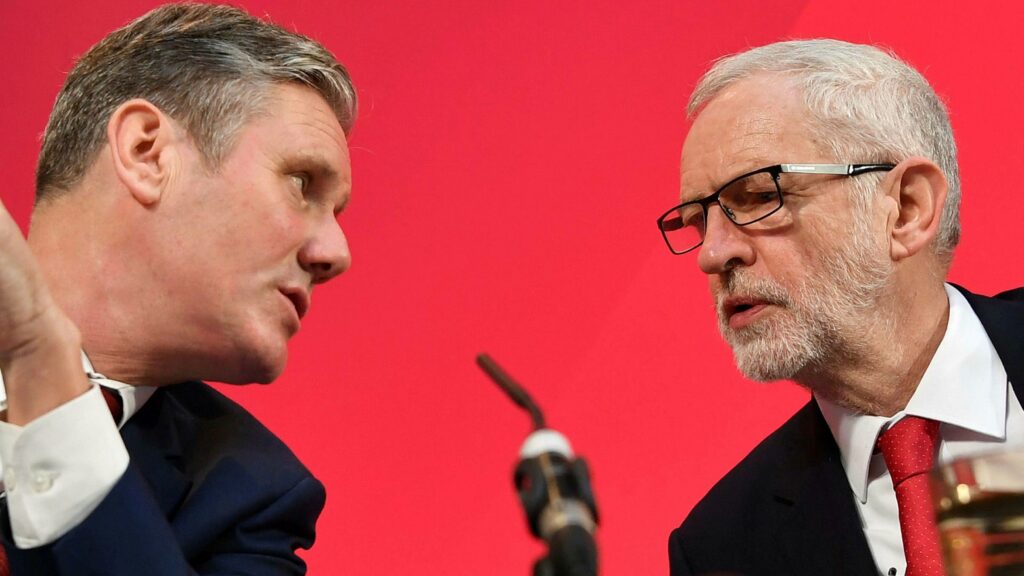The Social Democratic Party’s (SDP’s) victory in Germany has encouraged left-wing parties across Europe. In the UK, the Labour party would like to equal the SDP’s triumph by beating Boris Johnson’s Conservative party at the next election. However, this year’s Labour conference (25 to 29 September) has seen sharp differences emerge between the party leader Sir Keir Starmer and the party’s left-wing about how to beat Johnson.
Promises made
Under the leadership of left-winger Jeremy Corbyn, the Labour party lost heavily to Johnson’s Conservatives in the 2019 election. Labour recorded its worst results since 1935, losing much of its traditional working-class support. As a former head of the UK’s Crown Prosecution Service with an impressive legal record defending human rights and opposing terrorism, racism and violence against women and having been knighted in 2014, ‘Sir’ Keir Starmer was elected Labour leader in 2020 to restore confidence in the party. He had done well opposing the Conservatives on Brexit and, in contrast to Corbyn who many saw as a dangerous radical, Starmer was a reassuring figure. However, Starmer was elected as a reassuring figure who would deliver a left-wing agenda, which he set out during his leadership election campaign in 10 pledges. The Labour party’s left-wing believes that Starmer is now reneging on those promises.
The left-wing has reason to worry. At the start of the conference Starmer forced through changes to the rules for electing Labour leaders. The change makes it more difficult to elect left-wing candidates like Corbyn. Starmer has also seemed to backtrack from his pledge to nationalise the railway, mail service, energy and water companies. Starmer argues that his pledge to bring these companies into ‘common ownership’ does not necessarily mean nationalising them. The Labour leader is also on record as saying that he will break his promises if they could stop him winning the next election, arguing that his most important pledge is to make Labour capable of winning power. Former leader Jeremy Corbyn’s Labour party membership has also been suspended on the grounds of allowing anti-Semitism to spread in the party; an accusation Corbyn and his supporters strongly deny.

Win, win
For some on the left this is too much. On 27 September, during the conference, Andy McDonald resigned from Starmer’s team accusing him of dividing the party and not keeping his promises. McDonald claims that he resigned because Starmer’s office told him to argue against a £15 minimum wage at a conference fringe meeting. Interestingly, Starmer has never promised a £15 minimum wage and it has never been Labour party policy. The incident shows how tense relations are between Starmer and the left-wing of his party, which seems prepared to openly challenge any move away from the radical agenda they believe the party needs to win re-election.
Starmer argues that to win, Labour needs to build a coalition of middle and working class voters who believe that Labour will tackle crime, invest in the health service, deliver an education that will bring opportunities for their children and, above all, trust a Labour government to manage the economy not just fairly, but efficiently. He believes the party is already radical with proposals to improve workers’ rights and for a £28 billion green new deal to combat climate change. For Starmer the problem in the 2019 election was not Labour’s radical manifesto, but that working people did not believe in it.
Starmer, is from a working class background. He believes he understands the traditional Labour voters who deserted the party and voted Conservative in 2019 and that he knows how to win them back. ‘Sir Keir’ is a serious man who contrasts himself with the shallow, privileged, ‘trickster’ Boris Johnson.But while clever and sincere, Starmer can also come across as ponderous and a bit dull. In his conference speech on 29 September, Starmer summed up his vision of a Labour government that provides work, care, equality and security. Although his speech received much applause and a standing ovation, he was heckled throughout by Labour party members protesting the need for a £15 minimum wage.
For all of his qualities, Starmer, sometimes, seems rather isolated as a leader. If he cannot convince his party of his vision, it is unlikely that he will convince his country.


